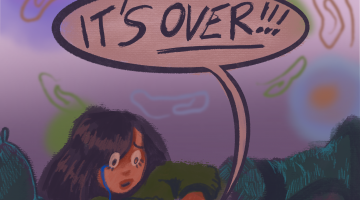One day, I was on the phone with an old friend from middle school. After talking for more than an hour we had nothing to talk about, but neither one of us wanted to hang up, so I asked bluntly, “If you could live in any time period, which one would it be?”
His response was something along the lines of the ’80s or ’90s. Although both of us were born in the late ’90s, he just wished he was a teen in one of those periods. He explained to me that he had always loved the music, the TV shows and how easy life seemed during those times. We talked about shows like “The Nanny” (one of his favorites), “Saved by the Bell,” “Sabrina, the Teenage Witch” and how terrible, yet lovable Mexican soap operas were during that time. After talking for a while about how “hip” our parents looked with their crazy hair and their colorful shirts, he then asked me, “If you could live in any time period, which one would it be?”
I immediately answered, “The 1920s.” He was a little thrown off by how quickly I had answered and I had to explain that I had just finished reading and watching “The Great Gatsby.” I mean, everything about that book and the movie screams “American Dream” in your face, and like Fergie most avidly says over and over again in her song, “a little party never killed nobody.” For me, the 1920s are portrayed as a time of abundance around the north side of the country, when New York City was seen as the city that never sleeps, and the slow beginning of the liberation of women. I would have loved to be one of the pioneers of that movement.
But soon we came to the realization that if we were to live in those time periods we would not have had Daisy Buchanan’s or any of the “Saved by the Bell” characters’ lives.
Both of us are some of the largest minorities in this country. I am a young Latina and he is a young homosexual Latino. We both are part of the lower middle class and still live with our parents.
If I, a young Latina, were to live inside the United States in the 1920s, it would have been most likely as an immigrant, following my husband who probably would work in the fields, and I would be staying at home with our children. I wouldn’t have the party that Fergie promised, and there would be no Jay Gatsby building a beautiful palace for me.
If he, a young homosexual Latino, were to live in the 1980s or 1990s, he would probably have it a little bit easier than me because: He is a man, and in those years we see a larger number of homosexuals trying to come out of the closet. Yet, we must remember that during the mid-1980s we saw many cases of AIDS, and if you were gay, you were immediately categorized as an AIDS carrier and were unjustly discriminated for your sexual orientation. Also, as much as it hurts me to admit it, our Latino/Hispanic culture has not fully embraced homosexuality, and that would have made his life much harder with his family and his friends.
We both understood the implications of those time periods and what they meant for us and for others. Our society has based itself in race and color, gender, sexual orientation and economic status since the creation of this country.
At the end of the day, we both understood that even if we romanticize the “good ol’ days” and complain about our lives today, we have to admit, society has come a long way since then. This is no excuse to stop our fights against racism, gender discrimination or discrimination based on sexual orientation. On the contrary, it is an incentive for us to continue fighting because things do change. It is not easy and it is not going to happen all in one day, but we can change society.
Today we should be grateful for life, for having a higher education, for being able to marry who we want, for deciding if we want to have a family or not, for being seen as human beings, but most importantly, we should be grateful for everyone who fought for us in the past. Our fight against discrimination is not over. We still have a long way to go. But today, I am grateful for living in the present, and for being able to fight for the rights of our future generations.
Luz Peraza studies international affairs. She can be reached at alexandraschultz@unr.edu and on Twitter @TheSagebrush.










